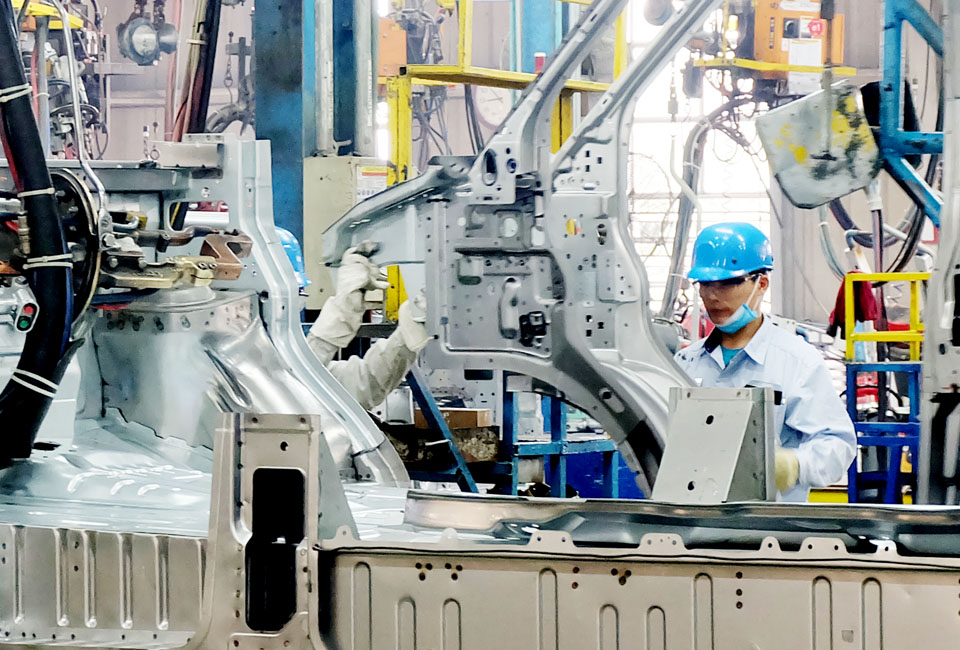As the tax and land fee incentives that have made Vietnam appealing to foreign investors are about to end, the Government needs to devise a different strategy to attract new foreign investors and retain existing ones.
Operational foreign investments decline
According to the Foreign Investment Agency at the Ministry of Planning and Investment, opportunities have arisen, given Vietnam’s foreign direct investment results in the first four months of the year. There were 750 new FDI projects registered between January and April, with total pledged capital of US$4.1 billion, rising by 65.2% and 11% over the same period in 2022, respectively. In addition, foreign investors got involved in 1,044 mergers and acquisitions totalling US$3.1 billion. The transactions inched up by 1.8% in volume and soared by 70.4% in value year-on-year.
But the country saw a substantial decline in extra capital injections into operational foreign-invested projects. Only US$1.6 billion was injected into 386 operational FDI undertakings, plunging by 68.6% over last year’s January-April period. The drop has led to a subsequent decrease of Vietnam’s total FDI by the end of April, which dipped by 17.9% year-on-year at US$8.9 billion, according to the agency.
Still, falling foreign capital inflows seem to be part of a worldwide pattern as it has also rattled other countries and territories in light of prolonged global economic headwinds. From recession fears to geopolitical uncertainties, the market has put millions of companies across the globe to the test, and businesses operating in Vietnam are no exception.
However, data matters when measuring the health of the economy, and the fall in newly pledged FDI capital will certainly raise doubts about the country’s business environment, according to experts. The decline might have resulted from some obstacles to the operations of foreign-invested firms in Vietnam, prompting hesitation among those thinking about starting a business in the Southeast Asian country.
Voices of international investors
Local firms have highly praised the Government’s proactive effort to promote investment activity and support investors. Yet, there remain challenges when it comes to administrative procedures, which have placed a considerable burden on the operations of Vietnam-based enterprises, including foreign-invested ones.
Kim Huat Ooi, general manager of HCMC-based manufacturer Intel Products Vietnam, said one of the main factors that affected Intel’s decision to settle in the city was the “One Stop Shop” (OSS) mechanism given to the Board of Management of Saigon Hi-Tech Park (SHTP).
This approach, which allows speeding up the processing of administrative paperwork required for business operations, could enhance the partnership between the city administration and local investors in the SHTP. As Ooi put it, effort plays an essential role in a long-term development strategy.
“We hope that HCMC will resume the OSS to make it easier for business activities,” he added.
According to a representative of AES Corporation, an American power generation enterprise, the Government’s administrative reform would provide crucial impetus for the expansion of Vietnam’s energy industry, particularly renewable energy projects. When AES initially began doing business in Vietnam, the Government’s support and immediate incentives were essential to materialize the firm’s investment plan.
Greg Testerman, chairman of the American Chamber of Commerce (AmCham) in Vietnam, noted that in addition to delivering financial benefits, U.S. companies in Vietnam have sought to provide administrative management expertise to local officials.
AmCham proposed the Government make the immigration procedure fast and easy, especially for foreign tourists. If done properly, this would help fuel Vietnam’s economic growth.
The Government should address the lengthy process of approving investment projects, especially those underway, according to Masayoshi Fujimoto, chairman of the Japan-Vietnam Economic Committee, under the Japan Business Federation.
Some 60% of Japanese enterprises in Vietnam told the Japan External Trade Organization (JETRO) in Hanoi that the administrative process pace has slowed recently. Vietnam should be determined to do away with the informal costs, as recommended by JETRO, and increase the efficiency and openness of administrative paperwork.
Hong Sun, chairman of the Korean Chamber of Commerce and Industry (Kocham), said South Korean enterprises in Vietnam had difficulty obtaining work permits for international employees and meeting fire safety requirements.
Hong stated that developing an online support platform could help this score. If the business climate in Vietnam remains favorable, South Korean companies might consider increasing investments in the high-tech, energy and financial sectors, he added.
Time to change
According to experts, the slowing flow of foreign capital into Vietnam may be due to the country’s inadequate management capabilities and insufficient readiness in human resources, infrastructure systems and supporting industries.
Given rising costs in Asia and elsewhere post pandemic, multinational corporations are increasingly considering moving operations back to Europe and the U.S. This movement has increased the challenges for developing countries such as Vietnam to attract and retain investment.

In the U.S., for instance, the Government has established a number of pro-business policies in the hopes of drawing more companies back from abroad. In a similar vein, European manufacturers are increasingly reshoring work that had previously been done in other regions.
Amid intensified pressures, emerging production centers such as Vietnam have continued to compete for a larger capital inflow despite a more cautious market sentiment.
Meanwhile, as the global minimum corporate tax of 15% is set to take effect in 2024 in 140 countries and territories, including Vietnam, concerns have been voiced about the forthcoming end of the country’s tax incentive program for foreign-invested firms.
At least 1,015 FDI businesses in Vietnam would be negatively affected by the move. The country, which has long relied on tax and land fee incentives to attract investment capital, seems to be at a crossroads.
According to Nguyen Minh Cuong, chief economist of the Asian Development Bank, a shift in capital attraction strategy is unavoidable when investment portfolios are restructured internationally.
Local companies have asked the Government to assess the support package and seek alternatives for incentives before implementing the new tax rate.
Do Thien Anh Tuan, lecturer at Fulbright School of Public Policy and Management, said Vietnam should prioritize high-tech foreign investment while pursuing sustainable growth and boosting local manufacturing competence.
The revised approach for attracting foreign direct investment in Vietnam, if any, must emphasize improving the country’s logistical infrastructure and transportation connections.
Meanwhile, it is vital for the country to foster a more conducive business climate and map out land use plans for industrial production.
Chairman of the European Chamber of Commerce in Vietnam (EuroCham)Gabor Fluit said despite challenges, Vietnam had been seen as a rising star in global commerce and investment.
But there are no grounds for complacency, said Fluit. To maintain its economic momentum, Vietnam “should more than ever have a strong determination and make bold moves toward advancement”, he added.









